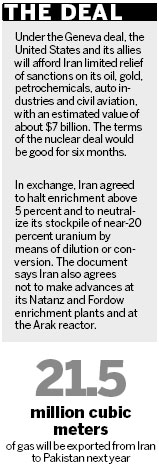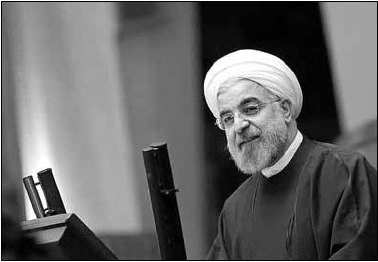Iran, Pakistan vow to get pipeline on track
Funding, risk of sanctions blur the project's future
Pakistan announced on Tuesday it has agreed with Iran to accelerate implementation of a long-stalled gas pipeline project that will link Iran's South Pars gas field with customers in South Asia.
The United States opposes the $7.5-billion project because it could violate sanctions imposed on Iran over nuclear activities that Washington suspects are aimed at developing an atomic bomb, allegations that Teheran denies.
In an announcement that follows last month's breakthrough pact between Iran and global powers, Pakistan said both sides will speed up work to finish pipeline construction.

Pakistan's Ministry of Foreign Affairs said in a statement that petroleum ministers of the two countries met in Teheran on Monday to discuss the project, which has been beset by repeated delays.
The two countries decided to fast-track the pipeline and make a plan to resolve problems, the ministry said. However, no details were given on how Pakistan plans to overcome the numerous problems associated with the project, such as funding and the risk of sanctions. The ministry said experts from both sides will meet soon to speed up work.
Pakistani officials in the Teheran meeting also reiterated their government's commitment to fulfill its contractual obligation to the pipeline and stressed that the project is of "immense importance" to meeting Pakistan's energy needs.
Earlier on Monday, Iran and six world powers began expert-level talks to work out the specifics in implementing the landmark accord for Teheran to curb its disputed nuclear program in return for a limited easing of sanctions.
The preliminary accord is seen as a first step toward resolving a decade-old standoff over suspicions Iran might be covertly pursuing a nuclear-weapon "breakout" capability, a perception that has raised the risk of wider Middle East conflict.
Officials from Iran and China, the United States, France, Germany, Britain, and Russia met at the Vienna headquarters of the UN nuclear agency, which will play a central role in verifying that Teheran carries out its part of the interim deal.
The Vienna meeting will seek to nail down the start date of Iran's promised six-month nuclear freeze, how this will be monitored, and when sanctions will be eased.
Reuters-AFP
|
Iranian President Hassan Rouhani delivers a speech to Parliament before presenting the proposed annual budget on Sunday. Rouhani said that last month's nuclear deal with world powers has already boosted the country's economy.Iranian Presidency via Agence France-Presse |
(China Daily 12/11/2013 page11)









